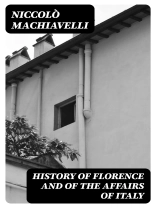Niccolò Machiavelli’s ‘History of Florence and of the Affairs of Italy’ is a seminal work that intricately weaves a narrative of political dynamics and historical events throughout Florence and broader Italy during the late 15th and early 16th centuries. Employing a clear, concise prose style, Machiavelli juxtaposes political theory with real-world consequences, examining the interplay between power, morality, and governance. This text not only reflects the tumultuous political landscape of Renaissance Italy but also serves as a profound commentary on the nature of power and the human condition. Through a combination of meticulous historical analysis and passionate storytelling, Machiavelli contextualizes the rise and fall of influential figures in a rapidly changing world. Born in 1469 in Florence, Machiavelli was a diplomat and political philosopher whose experiences in the volatile political environment of his time deeply influenced his writings. Witnessing the strife between republics and principalities, as well as the influence of various powerful families like the Medici, he sought to understand the mechanisms of political power and the psychology of leaders and their subjects. His firsthand observations, paired with a classical knowledge of history, shaped his perspectives on statecraft and governance. For readers interested in political philosophy, history, and the roots of modern political thought, Machiavelli’s ‘History of Florence and of the Affairs of Italy’ is an indispensable text. It invites readers to contemplate the lessons of the past, reflect on contemporary political dilemmas, and engage with timeless inquiries about authority and ethics in governance. This work is crucial for anyone seeking to comprehend the complexities of power and the historical forces that have shaped modern Italy.
About the author
Niccolò Machiavelli (1469-1527), an iconic figure of the Italian Renaissance, is renowned for his contributions to political theory and historical scholarship. Born in Florence, his life spanned a tumultuous period in Italian politics, an era that profoundly influenced his intellectual oeuvre. Machiavelli’s early exposure to Florentine republicanism and subsequent diplomatic career provided him with a wealth of experience that would inform his later writings. His seminal work, ‘The Prince’, often overshadows his other contributions to literature and history; however, his ‘History of Florence and of the Affairs of Italy’ stands as a significant historical treatise that chronicles the intricate web of power dynamics in Italy beginning in ancient times until his contemporaries. This expansive work not only illuminates the political landscape of Italy but also showcases Machiavelli’s analytical prowess and narrative skill. Rooted in a humanist approach to historiography, Machiavelli’s history writing eschews divine causality in favour of a more pragmatic examination of human actions and motivations, becoming a precursor to modern historical methodology. His distinct literary style – characteristically lucid and direct – allows for the intricate politics of the era to be accessible to a broad readership, reflecting his democratic ethos in knowledge dissemination. As a historian and political thinker, Machiavelli’s influence has stretched far beyond his lifetime, marking him as one of the foundational figures in Western political thought and historiography.












